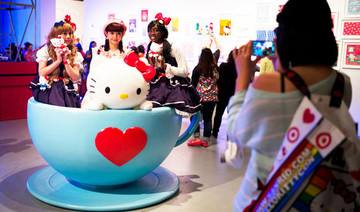LONDON: Students across 10 schools in Qatar gathered to plant 50 olive trees in solidarity with Palestine, Qatar Living reported.
The olive tree holds significant symbolic value for many Palestinians, representing both their national identity and a deep-rooted connection to their land. The destruction of olive trees is a recurring feature of Israel’s occupation of Palestine.
The initiative took place in the Gaza Garden within Education City and was led by Rola El-Annan, a teacher at Qatar Academy in Doha
“Our goal is to inspire students through diverse learning activities to reconsider and re-evaluate the perspectives, beliefs, values, definitions, and emotions that have shaped our past experiences and brought us to where we are today,” El-Annan told Qatar Living.
She emphasized the importance of student opinions and the development of self-awareness and self-expression.
The teacher continued: “Our students have displayed various emotions in response to the situation in Palestine, openly sharing their feelings and inquiring about what is happening. We are committed to providing them with support during this time, and this initiative is one of the ways we do so.”
The initiative served to educate students on sustainability, with the olive tree being chosen for its eco-friendly and sustainable qualities. “It provides fruit, oil, and timber. Its wood has a low carbon footprint, and its products are environmentally friendly,” El-Annan added.
Ibrahim Ali Bojssoum, a 10-year-old student at Tariq Bin Ziad School, said: “We have expressed our support for Palestinian people by planting olive trees here in Qatar. It made us feel like active participants, sparking our curiosity to explore and learn more, because this cause is relevant to all of us.
“I’m happy that our school is teaching us about the situation in Palestine. I am happy to be part of this project — I know that planting these trees will become an important memory for me.
“And we didn’t just learn about Palestine,” he added. “We went on an educational adventure. We learned how to take care of the land, about farming, and different aspects of sustainability. It showed us that everything is connected, and we can make the world a better place.”
Kenan Nizar Muhammad, an 11-year-old student at Qatar Academy Al-Kho said: “When I was younger, my grandparents used to plant olive trees in Palestine and would tell me about them. So, having these trees here in Qatar makes me feel closer to my home.
“I really like the idea of planting an olive tree with my schoolmates and learning about what’s happening in Palestine. It makes me happy to see them care, understand why supporting Palestine is important, and their empathy towards me as a Palestinian — they understand how I am feeling.”
























